Typhoid cases double in Hyderabad, doctors blame water
School-going children, senior citizens and those with outdoor jobs are found to be the most vulnerable.

Hyderabad: Severe lapses in sanitation with overflowing manholes and mixing of sewage and water pipelines are leading to contamination of water and food, leading to a spurt of typhoid cases in the city. The number of typhoid cases recorded so far this year has been very high, in comparison to last year, even as every hospital is seeing five new cases daily.
Since it is not a notifiable disease, no data is maintained about typhoid but experts say that poor sanitation conditions across the city and state have led to a surge in the disease.
Dr Satish Ghanta, senior paediatrician, explained, “typhoid spreads through contaminated food and water. The increased cases are an indication that sanitation in the city is not up to the mark. The disease does not spread through touch, virus or mosquito. It becomes important for civic authorities to carry out tests of drinking water, check for leaks and plug them and prevent mixing of sewage and drinking water, which is the prime reason for the spread of the disease.”
School-going children, senior citizens and those with outdoor jobs are found to be the most vulnerable. Making matter worse for the people on the health front, there is a combination of dengue and typhoid, and the treatment has to be aggressive to control both diseases.
Small hospitals and nursing homes are sending away patients as they have no beds to accommodate them. Many hospitals have confirmed that their ICUs are full.
Similarly, corporate hospitals are recording a huge spurt in number of out-patients and highly critical cases as in-patients.
Dr. Altaf Naseem, senior paediatrician, said, “we are noting high drug resistance. The response to medication has generally not been good. A patient who used to earlier take five days to respond to medications in typhoid is now taking a double of 10 days. The recovery period has prolonged because of misuse of antibiotics, due to which the bacteria in the body becomes resistant. The government must consider vaccinations for young children as they are suffering the most.”
The increased numbers show that water treatment, both by the government and by individuals at home level, has been compromised. The cleaning and servicing of reverse osmosis systems, purifiers and other water purification process are not being followed properly. To add to this, dependency on outdoor food outlets has seen a major rise, which has become a major source of contamination.
Senior government doctors at Niloufer Children’s Hospital and Fever Hospital say that this has been the worst season as number of patients has been at an all-time high.
In Fever Hospital, there are no beds and patients are being treated on the floor. The Niloufer Hospital has four children on each bed.
Government doctors say that seasonal diseases are seeing an increase as the schedule of dry and wet season is changing.

